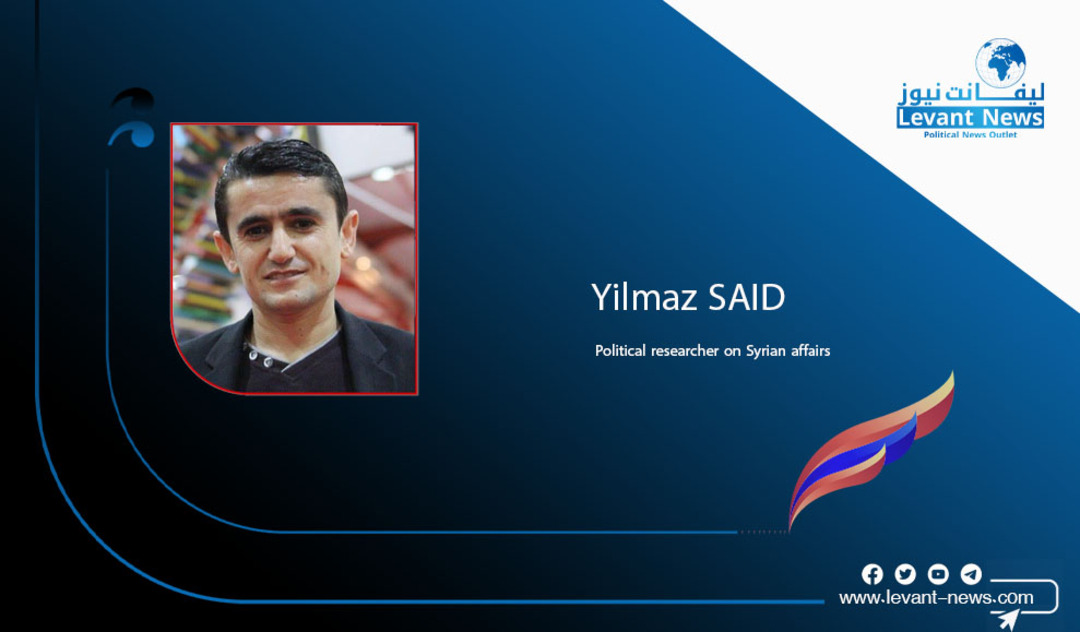-
Israeli Escalation Places Syria Between Regional Calculations and Security Concerns

As Syria emerges from the phase of conflict between the opposition and the now-vanished dictatorial regime, its new political leadership faces the fundamental challenge of redefining its foreign policy. This redefinition must ensure a balance between regional and international interests, avoiding the pitfalls of geopolitical ambiguity. The constitutional declaration that defines the transitional phase as lasting five years compels the new government to adopt a clear vision for its foreign relations, free from hesitation, to ensure state stability and prevent an ongoing nebulous perception of Syria by regional powers, primarily Israel and some Arab states.
However, this path is surrounded by obstacles, as numerous regional factors intertwine, complicating the construction of a new Syria. Among the most prominent challenges is the issue of foreign fighters, whose presence poses a security threat extending to neighboring countries, especially Israel. Additionally, the state’s stance towards the Muslim Brotherhood remains subject to regional division among states hostile to it and those cautious of its role in politics. Furthermore, the Turkish-Syrian rapprochement raises additional fears for some Arab states and Israel, especially with the potential return of Hamas and Islamic Jihad to Syria, which could coincide with the establishment of Turkish military bases within the country—something Tel Aviv considers a direct threat to its security interests.
In this context, adopting a preventive policy becomes a strategic necessity, focusing on managing regional concerns and leveraging international balances to build an independent, sovereign state capable of maneuvering flexibly without sliding into polarizations that could impede its path to stability. However, this approach faces a real test with the ongoing Israeli escalation inside Syrian territories, which seems driven not only by Tel Aviv's traditional stance on the Iranian presence but also by new calculations associated with the Turkish role and the nature of the new Syrian government.
Recently, the Syrian arena has witnessed a noticeable Israeli escalation, coinciding with the formation of a new government in Damascus. While the escalation appeared linked to Israel’s traditional policy towards Iranian influence in Syria, new factors have emerged in the confrontation, notably the rising Turkish role in Syria and the ideological nature of the new Syrian government, formed by individuals with previous jihadist backgrounds.
Confusing Turkish Diplomacy and Its Impact on Escalation
In recent months, Turkey has sought to expand its influence in Syria through several avenues, including discussions about maritime border demarcation that raised concerns for Israel, Greece, Cyprus, and Egypt, alongside leaks about security agreements related to establishing Turkish military bases inside Syria. Additionally, there have been Turkish signals of a religious nature, such as increasing interest in the Umayyad Mosque in Damascus, attempting to establish influence similar to what Iran has done with the shrine of Sayyida Zainab.
These moves have not gone unnoticed by the new Syrian government, which found itself compelled to deal cautiously with Ankara, nor by Israel, viewing Turkish influence as a potential threat to its interests. Unlike Iran, which suffers from international isolation, Turkey has extensive diplomatic relations with the West, making its influence more difficult to contain. Thus, it seems Israel is trying to send serious warning messages through military escalation, providing a justification for increased intervention in Syria, directed not only at the Syrian government but also at Ankara, indicating that attempts to replace Iranian influence with Turkish influence will be unacceptable.
The New Syrian Government and Its Jihadist Nature
Another reason that could explain the Israeli escalation is the nature of the new Syrian government, which includes figures with prior jihadist backgrounds, some of whom were linked to groups such as al-Qaeda. These backgrounds raise alarm among major powers like the United States, which has conducted operations in Idlib and assassinated leaders close to the new authority and their former allies, as well as causing concerns in Tel Aviv, which has long exploited the chaos in Syria to maintain a strategic balance in the region. Israel sees this government as a future threat, especially if it turns into a supportive environment for organizations hostile to it.
Despite the Syrian government's attempts to present itself as a political entity seeking to rule the country realistically, the history of some of its symbols continues to arouse regional and international concerns, giving Israel justification to intensify its military operations under the pretext of combating terrorism and preventing the emergence of new threats on its northern borders.
Turkey: From Supporter to Burden
Ironically, Turkey, which was at one time the foremost supporter of military activity in Syria, today represents a burden on the new government in Damascus. Its strategy has changed; Turkey no longer focuses solely on supporting armed factions but is now seeking to achieve direct military political gains, even at the expense of its former allies.
The Kurdish issue plays a role in this shift. The fate of the Kurds in Syria is tied to internal understandings within Turkey, especially between President Recep Tayyip Erdoğan and his allies in the Nationalist Movement Party and the Kurdish Workers' Party, which has significant influence over the Democratic Union Party, a key player in the Syrian Democratic Forces (SDF). If these understandings break down.
Yilmaz SAID
You May Also Like
Popular Posts
Caricature
BENEFIT Sponsors BuildHer...
- April 23, 2025
BENEFIT, the Kingdom’s innovator and leading company in Fintech and electronic financial transactions service, has sponsored the BuildHer CityHack 2025 Hackathon, a two-day event spearheaded by the College of Engineering and Technology at the Royal University for Women (RUW).
Aimed at secondary school students, the event brought together a distinguished group of academic professionals and technology experts to mentor and inspire young participants.
More than 100 high school students from across the Kingdom of Bahrain took part in the hackathon, which featured an intensive programme of training workshops and hands-on sessions. These activities were tailored to enhance participants’ critical thinking, collaborative problem-solving, and team-building capabilities, while also encouraging the development of practical and sustainable solutions to contemporary challenges using modern technological tools.
BENEFIT’s Chief Executive Mr. Abdulwahed AlJanahi, commented: “Our support for this educational hackathon reflects our long-term strategic vision to nurture the talents of emerging national youth and empower the next generation of accomplished female leaders in technology. By fostering creativity and innovation, we aim to contribute meaningfully to Bahrain’s comprehensive development goals and align with the aspirations outlined in the Kingdom’s Vision 2030—an ambition in which BENEFIT plays a central role.”
Professor Riyadh Yousif Hamzah, President of the Royal University for Women, commented: “This initiative reflects our commitment to advancing women in STEM fields. We're cultivating a generation of creative, solution-driven female leaders who will drive national development. Our partnership with BENEFIT exemplifies the powerful synergy between academia and private sector in supporting educational innovation.”
Hanan Abdulla Hasan, Senior Manager, PR & Communication at BENEFIT, said: “We are honoured to collaborate with RUW in supporting this remarkable technology-focused event. It highlights our commitment to social responsibility, and our ongoing efforts to enhance the digital and innovation capabilities of young Bahraini women and foster their ability to harness technological tools in the service of a smarter, more sustainable future.”
For his part, Dr. Humam ElAgha, Acting Dean of the College of Engineering and Technology at the University, said: “BuildHer CityHack 2025 embodies our hands-on approach to education. By tackling real-world problems through creative thinking and sustainable solutions, we're preparing women to thrive in the knowledge economy – a cornerstone of the University's vision.”
opinion
Report
ads
Newsletter
Subscribe to our mailing list to get the new updates!




















